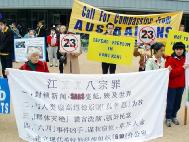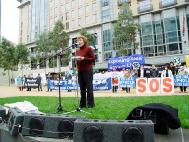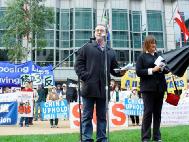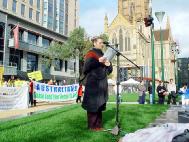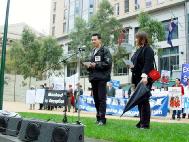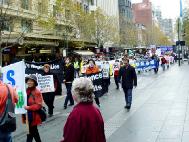Global Coalition against Article 23 Legislation Holds Rally in Melbourne, Australia (Photos)
(Clearwisdom Net) On Sunday, June 8, the Global Coalition against Article 23 Legislation rallied in Melbourne in the drizzle to peacefully protest the proposed Hong Kong Article 23 legislation. More than 100 people from different organisations and the public gathered in front of Federation Square, and then marched through the city center. Among the procession were several big banners and dozens of billboards, written with the words of "Exposing Lies, Saving Lives", "8 Major Crimes of Jiang", "Support the Global Lawsuit Against Jiang, Send The Criminal to Trial", "Against Article 23", "Uphold Human Rights, Stop Murdering" and others. The procession held a rally after parading through Chinatown in the city. Representatives from Amnesty International Australia, Hong Kong community, Christian Alliance, Australian Service Union, Falun Dafa Association, International Society for Human Rights and Taiwanese Community gave speeches one after another.
Ms. Robyn Kilpatric from Amnesty International Australia indicated that the implementation of Article 23 of the Basic Law would seriously damage the fundamental freedoms of the Hong Hong people and the concept of "One country, two systems". She gave several examples of how China blocks the information by various methods, such as closing down internet cafés, holding up emails, restricting the use of search engines, as well as filtering key words, a method adopted recently. Four Chinese young people were sentenced to seven years for reading the "forbidden" web pages in internet cafés, and if Article 23 was to be passed, such tragedies would also happen to Hong Kong's people. She also called on the Australian public to pay attention to those who have lost freedom while enjoying the freedom themselves.
Mr. Matt Wright from Australian Service Union cares very much about the human right issues of China. He pointed out that, it was very clear from the outset that this should not be confused with Article 23 of the Universal Declaration of Human Rights as set down by the United Nations, which is actually quite the opposite. When totalitarian laws such as these are enacted it is inevitably the workers who suffer. The introduction of laws such as Article 23 in Hong Kong is never designed to affect the people at the top--the government officials and the rich. They are designed to persecute and discriminate against those who are most vulnerable. Article 23 is neither descriptive nor clear. It is ambiguous and open to interpretation and manipulation, and has been deliberately set up under pressure from Jiang so it can be abused to suit the situation, which means it can be applied to just about any organisation, group or person the government considers a so-called "national security risk", although their activities would seem normal in any socially democratic society. Once the legislation is passed, practices such as meditating in the park or attending church could become illegal. It will be used to curb the rights of Hong Kong citizens, namely the rights to freedom of association, freedom of speech and freedom of assembly, while these are rights that should be enjoyed by each and every person in the world today. It will also be used to outlaw groups such as Falun Dafa practitioners, religious groups and activists for social and democratic change. And it doesn't stop in Hong Kong. Citizens of Hong Kong who are residing in other countries will be open to extradition, prosecution and severe penalties. Article 23 is a severe violation of human rights. Such laws are typical of the totalitarian regime in China that is now beginning to rear its ugly head in Hong Kong. These laws are testimony to the human rights violations committed by Jiang, as well as the testimony to his crimes in persecuting Falun Gong. A lawsuit has been filed to bring Jiang to justice. When he is apprehended and brought to justice he will be tried for genocide and crimes against humanity.
Mr. Wright also indicated, that Falun Gong, or Falun Dafa, is a peaceful spiritual practice that is based on the fundamental universal principles of "Truthfulness, Compassion, Tolerance". The Chinese government has outlawed it with the excuse of so-called "national security risk." Thousands of Falun Dafa practitioners have been illegally imprisoned in labour camps, prisons and mental hospitals in China. Hundreds of these have been killed while in custody. These people have been bashed, tortured and treated like animals. They have been injected with dangerous and experimental drugs that have on occasion caused serious brain damage and even death. They have also been separated, sometimes permanently, from their families. But the Chinese Government says, "There is no persecution, we are not guilty of this." Mr. Wright said, "Well, I have seen countless photos of the victims of this horrible torture and abuse and I have heard their testimonies. It is as real as I am standing here today and the world needs to know about it. These abuses continue to occur in mainland China and will also occur in Hong Kong if Article 23 is introduced."
Ms. Ana Vereshaka, the spokeswomen of the Falun Dafa Association talked about the recent persecution of Falun Gong practitioners in China. People on site sighed with understanding and sorrow. According to the report of World Organization to Investigate the Persecution of Falun Gong on March 20, under the direction of Jiang, the ex-Chairman of China, the Jiang regime carries out a policy of "defaming their reputations, bankrupting them financially, destroying them physically" in an attempt to eradicate Falun Gong, and has so far drawn upon an enormous amount of manpower and financial resources nationwide. The regime cruelly tortures and murders Falun Gong practitioners who hold belief in "Truthfulness, Compassion, Forbearance", and has expended one quarter of China's financial resources to persecute Falun Gong. It also enforces Jiang's secret order of "Death from beating is nothing and shall be counted as suicide, the body shall be directly cremated" among various government levels, which resulted in over 720 Falun Gong practitioners losing their lives for not being willing to give up their beliefs. She indicated that if the Article 23 legislation is passed, it would bring disaster to the Hong Kong people, from both economic and democratic aspects. It allows the police to enter residential buildings and arrest people at any time without court warrants or evidence. The police's suspicion is considered evidence enough. The Article 23 legislation allows trials to be held in the absence of the appellant or his or her lawyer. Further, wherever the Hong Kong residents live, they would be subject to seven years to life-time imprisonment if they break this legislation.
Mr. Wande Lin, the representative of the Taiwanese community was unable to attend this rally, however he asked one of the his friends to express his opinion for him. He said, "In the 18th century, Mr. Patrick Henry said 'Give me liberty, or give me death.' I came from Taiwan and because I have lived in a country that transformed from a dictatorship to a democracy, I really understand the value of these words and the importance of liberty. This is why I support this demonstration." He pointed out that under a dictatorship, people have no freedom of speech, religion, assembly and they live worse than animals in the zoo, because at least those animals, while lacking freedom, don't have to worry about food. People living under dictatorships not only lack freedom, but also lack basic protections that should be provided by their government. For example, SARS broke out last November, but the Chinese Government covered up cases for as long as five months. As a result the epidemic spun out of control and spread to 38 other countries. It was only when the World Health Organization issued warnings to travellers going to China that Chinese authorities felt the pressure and confessed to the seriousness of its SARS outbreak. This shows that the Chinese government cares more about their power than their own people's lives. Similarly, during the epidemic, the Hong Kong government brought Article 23 to parliament and tried to pass it. If Article 23 is passed, the people of Hong Kong will lose their freedom. He hopes all people will work together to help people retain their freedom.
Mr. John Launder, from Australian Section of International Society for Human Rights, expressed his organisation's grave concerns over the proposed introduction of Article 23 into the Basic Law of Hong Kong. He indicated that the vaguely defined national security laws pose a distinct threat to basic civil liberties and could be used by Beijing to ban particular religious and labor organizations that operate in Hong Kong and mainland China. The very institution of these laws will stifle debate, freedom of the press and freedom of association, and will allow the Hong Kong government to legally persecute legitimate criticism and dissent. China has made great strides in modernization of its economy over the last two decades, but its continuing disregard for the civil and political liberties of its own citizens is a paramount concern for the long term security of the region and globally.
Mr. Wing Tang, the representative from the Hong Kong community, said that on December 15 last year, around 60,000 people hit the streets in Hong Kong to protest against Article 23. It was the largest public demonstration in Hong Kong since the 1989 Tiananmen Square massacre. These two events were possible in Hong Kong because people could openly exercise their right to free speech and assembly. But this may all change next month on July 9th, when the Hong Kong government is to vote to enact anti-subversion legislation under Article 23 of Hong Kong's Basic Law, most likely as a result of pressure from Beijing. The laws are intended to punish acts of treason, secession, subversion and sedition, but are widely seen as targeting activities and groups that Beijing would like to curtail. The legislation states that any organization banned by Beijing shall be banned in Hong Kong as well. The Article 23 legislation is a threat to a free and open society in Hong Kong, and it will give the government the green light to prosecute based on political considerations, including those people who simply express views peacefully. As for the recent SARS outbreak in Hong Kong, Mr. Tang said that Hong Kong residents regard Article 23 as more terrifying than SARS, because SARS was temporary, while once Article 23 is implemented, it will remain indefinitely.
Mr. Zhansuo Lu from the Overseas Chinese Democracy Coalition represented Chinese Christians. He said, according to the report by the New York based "Committee to Investigate persecution on Religions in China", the Chinese regime has not only deployed all kinds of cruel and illegal means to persecute Falun Gong, its treatment of Christians is also very inhumane. Since its open policy, among 60 million family church Christians, 2.7 million have been detained at will, which means that one out of every 22 Christians has been detained. Furthermore, according to the statistics, over 440,000 Christians have been sentenced to forced labor camps, over 10,000 have been killed, and over 20,000 were tortured to disability. The figures are shocking. Mr. Lu expressed his concern about the situation of the 70 million Chinese Christians, and called all people to take actions to urge the Chinese government to cease its persecution of all religious and spiritual groups, and allow full freedom of belief in accordance with the Universal Declaration of Human Rights, the International Covenant on Civil and Political Rights (ICCPR) and China's own constitution.
The attending speakers from all circles all pointed out the damage that Article 23 would bring to people in Hong Kong and all over the world.
This event attracted several media, and reporters, including those from the community TV station, Channel 31, and New Tang Dynasty TV.
